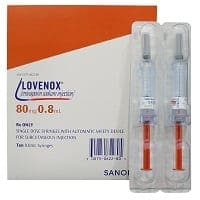Blood clots after surgery are a risk for any patient, and being overweight can increase the risk significantly. Lovenox (generic: enoxaparin) is a short-acting, injectable blood thinner that is frequently used after surgery to prevent deep vein thrombosis (DVT). Some surgeons use it in 100% of patients, and others use it selectively based on the patients risk. In any case, if your doctor prescribed Lovenox for you either before or after surgery, it is IMPORTANT that you use the medication as directed by your physician!
DVT’s can be serious after surgery as sometimes they can travel to the lungs, which is called a pulmonary embolism (PE). In addition to blood thinners such as Lovenox, frequent walking after surgery will also reduce the risk of DVT.
Lovenox (generic: enoxaparin) is dispensed in pre-filled syringes matching the dosage your doctor wants you to have. Injecting is pretty simple and causes minimal discomfort. Please view the information below from the Lovenox® web site to learn more about how to do your injections properly. Note that significant black-and-blue bruising can occur around injection sites, this is normal. If you have any signs of significant bleeding please call your doctor immediately!
Note: You may have received heparin if Lovenox was too expensive on your insurance plan. Heparin is an older medication that is cheaper and a reasonably acceptable alternative to Lovenox. The protocol for injecting heparin is different. Please click here for instructions on heparin injections.
When you start your injections is based on what time your surgery started:
- If your surgery started before 3pm, start your injections at 8pm on the night of surgery
- If your surgery started after 3pm, start injections the following AM



